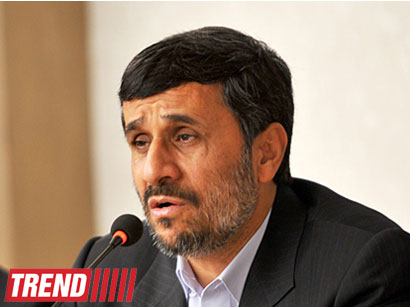Azerbaijan, Baku, Dec. 16/ Trend G.Mehdi/
Iran's main financial problem is outstanding bad loans of the banking system, the Fars News Agency quoted President Mahmoud Ahmadinejad as saying on Friday.
"Some 300 individuals hold 60 percent of the nation's total money," he said, but added that "there is no financial shortage in the country."
Khabar Online website has recently brought up Iranian Central Banks' statistics, reporting in November, that government's debt to the banking system has seen a sharp increase for the last three years, as the mount reached $38,3 billion (by the official USD rate in Iran) of the previously mentioned $57 billion.
Khabar online reported that since June 2008 to June 2009, the government's debt has risen by $5 billion, and later somewhere in 2011-2012 it has already increased by $12 billion.
Other "inside problems" include the willingness of Iranian banks to grant long-term loans from short-term deposits, and inability to monitor and manage the given loans on the previous year transaction archives.
Speaking of the factors that affect Iran's banking system from the outside, one of the major ones is the impact of international sanctions on Iran's economy and banking sector.
Minor Iranian banks are also in debt to Iran's Central Bank, as it has reached 370 trillion rials (some $30 billion) in the first quarter of the past calendar year.
Debts of commercial banks and specialized banks amounted to 136 trillion rials and 239 trillion rials, respectively.
The total debts of banks to the central bank hit 168 trillion rials, 231 trillion rials and 135 trillion rials respectively three to five years ago.
At the beginning of 2012, the U.S. and its European allies imposed sanctions on Iran's oil and financial sectors with the goal of preventing other countries from purchasing Iranian oil and conducting transactions with the Central Bank of Iran.
On October 15, the EU foreign ministers reached an agreement on imposing another round of sanctions on Iran.
The embargoes followed suspicions that Iran is pursuing non-civilian objectives in its nuclear energy program, which Tehran has strongly rejected.
Iran argues that as a signatory to Non-Proliferation Treaty and a member of International Atomic Energy Agency, it is entitled to develop and acquire nuclear technology for peaceful purposes.






